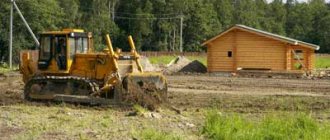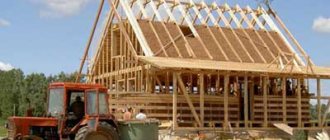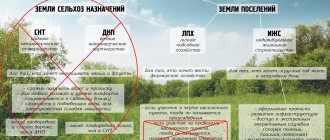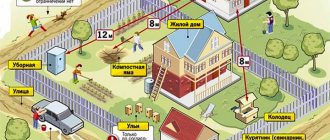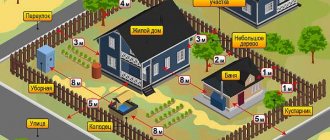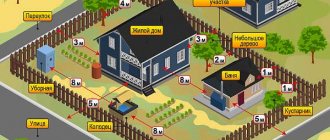Owners of plots intended for gardening strive to improve them as much as possible and build residential and utility buildings.
But before starting construction, it is worth studying the legality of the construction of various objects, existing requirements and standards.
If they are followed, citizens will not have problems when decorating buildings, as well as disagreements with neighbors.
Legal standards for construction
The main act regulating the development of garden plots, the creation of non-profit associations of owners, their management and protection of the rights of members is Federal Law No. 66-FZ.
This act is valid only until December 31, 2018. From the next day, a new law No. 217-FZ comes into force, in which summer cottages will be equated to garden plots , some provisions on non-profit partnerships will change, and the concept of common property will be introduced.
A site with permitted use for gardening may be located on agricultural land or within the boundaries of a populated area:
- For plots located within the boundaries of a populated area, it is necessary to study the design of the layout of a specific territory in accordance with Art. 42 Civil Code of the Russian Federation (if approved). The document delineates the zones of existing facilities, their characteristics, and areas where new buildings can be built. It is approved by a local authority after public hearings or by a regional executive authority without hearings.
- To build on agricultural land, you do not need to follow the red lines and rules defined by the territory planning.
It is imperative to take into account the type of territorial zone where the plot is located.
Horticultural plots are usually located in agricultural areas, but there are also plots in residential areas.
For different zones, different town planning regulations are established , which define:
- Basic, conditionally permitted and auxiliary VRI plots.
- Characteristics: maximum area of plots, distance of objects from boundaries, number of storeys, minimum share of landscaping on the plot and others.
You can become familiar with the town planning regulations, planning and development projects by contacting the authorized body of the local administration.
Pros and cons of two types of OPF
In terms of advantages and disadvantages, TSN gives managers great powers. They have the right to make decisions independently, without prior consultation with the participants of the partnership. In a situation requiring immediate action, management has all the necessary tools.
TSN unites owners of various types of real estate. These are not only garden plots, but also garages and apartments. Not only members of the organization can be elected to the governing bodies of TSN, making it possible to attract personnel from outside. SNTs often faced situations of staff shortages when participants refused to fill vacant positions.
You are advised by the best qualified lawyers
Free: Our lawyers provide free initial consultation on any legal issues. 90% of cases are resolved with one free consultation.
Around the clock: for real estate in an online chat, or use the forms on the website
The rules are prescribed in the TSN charter, allowing management to resign in the event of gross violations, inability to cope with assigned responsibilities, and other serious circumstances.
Contributions may be levied not in the form of a fixed amount, but in proportion to the area occupied by the site or the number of such sites. TSN provides the opportunity to get rid of targeted contributions, freeing participants from paying for common property. They are relieved of property liability for the obligations of the partnership.
Note!
The disadvantage of the TSN form is the impossibility of simplified taxation.
Objects on the land plot
The owner’s right to develop his plot is secured by the Land Code of the Russian Federation (Article 40) and the Civil Code of the Russian Federation (Article 263). All buildings that are allowed to be built and erected on lands for gardening can be divided into several groups.
Garden houses
The main difference between such buildings and residential ones is the seasonality of use . You can live in them only in the warm season, to take a break from gardening. Small houses can be used as a warehouse for equipment and crops. The buildings are not heated and are not supplied with communications.
You can live in such buildings, but you cannot register .
Exceptions are garden houses built on garden lands located in populated areas, which are equipped with all conditions for year-round living.
Such objects can be recognized as residential in court, and the owner will be allowed to register in it.
To do this, it is necessary that the objects meet the following requirements:
- Be in the full ownership of a citizen and not be the subject of a pledge.
- Compliance with all building codes, safety rules, sanitary requirements (level of sanitation).
- Fully equipped with all communications: heating, lighting, water supply and drainage, sewerage.
Garden houses should be used only by the owner's family ; dividing them into separate apartments is not allowed.
Individual residential
Houses recognized as residential must have all the necessary conditions for a comfortable life. The building is intended for individual use, not divided into apartments or blocks.
Recognition of a house built on a garden plot as residential is carried out in court or through local authorities .
Read more about the construction of residential and garden houses on lands for gardening in this article. Material about the characteristics of gardening sites located on agricultural land will also be useful.
Agricultural buildings
These include buildings that are intended for:
- cultivation,
- storage,
- storage
grown crop.
Also, this type includes structures, the construction and purpose of which is an auxiliary function for storing the necessary tools or equipment.
At the same time, the material of the walls and ceilings of which it consists is not important.
- Greenhouses are structures with a roof and walls that are used for growing seedlings and subsequently maintaining plants. The buildings may be equipped with a heating system.
- Sheds are covered utility rooms in which various property is stored and livestock are kept. Some barns have basements.
- Hangars , which are prefabricated structures of frame or frameless type. They can be used for storage, repair of agricultural machinery, as warehouses.
- A woodshed is a shed used for storing firewood and wood pellets for heating residential buildings.
Others
Other buildings include:
- bathhouse,
- garage,
- street toilet.
The buildings are not used for gardening purposes; they are necessary for the comfort of the owner of the plot.
Your own gardener
It is no secret that such a problem really exists, and it not only causes conflict situations, but also gives rise to a lot of questions for those who are members of a garden or dacha partnership and regularly pay all the dues to the SNT. In almost every gardening association you can find those who have their own views on general contributions.
An individual gardener and a member of SNT must pay the same amount for the use of common property
The situation is so acute that even the courts, when dealing with such disputes, do not always resolve them correctly. That is why clarifications from the Supreme Court at the beginning of the next gardening season can be very useful.
So, the gardening partnership filed a lawsuit against a citizen who worked and rested on the territory of this SNT, but was not a member of it. In legal language, such a person is called a “private gardener.”
Since this gardener had not paid membership fees for two years, but was quietly using the local infrastructure and “public property,” SNT asked the court to collect the debt and penalties from the citizen for two years.
The partnership also asked the court to oblige the defendant to sign an agreement with the partnership, the same as that signed by the members of the gardening partnership.
The defendant did not remain in debt and, for his part, filed a counterclaim - he agrees to sign an agreement with SNT, but on his own terms. According to the individual gardener, the board of the partnership should describe in detail how much he should be paid for each local infrastructure facility separately. And the defendant citizen demanded that for each infrastructure facility he be provided with formulas by which in each individual case the cost of using the common property of SNT was calculated.
Legal features of the functioning of SNT in the “Legal Consultation” section are explained by RG experts
The district court satisfied SNT's claim, but not completely, but partially. He did it in the following way: he collected the debt from the summer resident to pay general contributions, but refused to oblige him to sign an agreement with the gardening partnership for the use of the village’s infrastructure.
As for the counterclaim, the individual gardener was out of luck - the court did not agree with his demands to the board of the gardening partnership. And the court justified its refusal as follows.
According to the law on gardening partnerships, the district court said, the version of the contract proposed by the summer resident, with a detailed division for each object and formulas, is illegal and violates the rights of other gardeners.
Therefore, the court cannot force the board of the gardening partnership to sign the defendant’s version of the agreement. The individual summer resident's counterclaim was completely denied.
The appeal agreed with this decision of its district colleagues, but the Supreme Court did not. And this is what the Supreme Court did not agree with in this solution to the “dacha” conflict.
The district court, considering this dispute, stated that a citizen who gardens individually has the right to demand to conclude an agreement, but a gardening partnership does not have such a right.
To which the Supreme Court reminded its colleagues - according to the Civil Code (Article 421), citizens and legal entities are free to enter into an agreement. They cannot be forced to enter into an agreement, except in cases where the obligation to sign the agreement is prescribed by law or if there is a voluntarily accepted obligation.
Another article of the same Civil Code (445th) says verbatim the following - if the conclusion of an agreement is mandatory, and one of the parties stubbornly avoids this, then the other has the right to go to court with a demand to compel the signing of the agreement. In this “forced” case, the contract is considered concluded from the moment the court decision enters into legal force.
The Supreme Court emphasized that the law on gardening partnerships states that citizens have the right to garden individually. At the same time, they have the right to use the infrastructure and common property of the gardening partnership.
It is specially emphasized that individual gardeners must use the common benefits for a fee and under the terms of an agreement concluded with the partnership “in writing and in the manner determined by the general meeting of members.”
But such “individualists,” and this is emphasized in the law, are deprived of the right to enjoy the benefits of their garden partnership in the event of non-payment under the contract and on the basis of a decision of the board or general meeting. Another important point that was drawn to the attention of colleagues by the Judicial Collegium for Civil Cases of the Supreme Court of the Russian Federation is that the amount of payment from both an individual gardener and a member of the SNT should be the same. The conclusion from all that has been said: the conclusion of an agreement on the use of infrastructure facilities of a gardening partnership for individual gardeners is mandatory by law. The high court also clarified that both the gardening partnership itself and an individual gardener could file a claim to force them to sign an agreement with SNT. But denying the board of a gardening partnership the right to file such a claim, as the district court said, is illegal.
But that's not all. The High Court confirmed not only the rights of the gardening partnership, but also the rights of the gardener who wants independence from SNT. The Supreme Court said that the local court had no grounds for “leaving the gardener’s counterclaims unsatisfied.”
And the Supreme Court reminded about the Civil Code. It contains article 445. It lists the conditions under which the contract is considered concluded from the moment the court decision enters into force. Therefore, the district court’s reference to the fact that the version of the agreement of an individual summer resident does not comply with the law on gardening partnerships, violates the rights of SNT members, does not relieve the court from the need to clearly spell out the conditions under which an agreement between an individual gardener and the partnership should be concluded.
As a result, the Judicial Collegium for Civil Cases of the Supreme Court of the Russian Federation decided to cancel the decisions of local courts adopted on this dispute and reconsider the “dacha” dispute anew, but taking into account the comments made by the Judicial Collegium for Civil Cases of the Supreme Court of the Russian Federation.
What to do if you can’t build
If the construction of a residential building on your garden plot of land is impossible for some reason, it is worth finding out whether it is possible to change the VRI to the following:
- Individual housing construction. Advantages in creating infrastructure and utility networks at the expense of the budget. But construction will require a design, permission and subsequent approvals from various authorities. And the land plot must have the category “Land of populated areas”.
- For running a dacha farm. The plot will have a lower cadastral value and a lower taxation level. The building can be registered under the “dacha amnesty”.
- Private household plot located within the boundaries of a populated area. May have a significant area, simplified procedure for registering a structure.
- A peasant farm is suitable for owners running a farming business. The plot area can be large.
Horticultural plots are characterized by high soil fertility, so to change the VRI, you may need to prove its deterioration, or have another compelling reason for the transfer.
What details are required for an application to join a partnership?
The application for admission to the partnership shall indicate:
- surname, name, patronymic (last - if available) of the applicant;
- the applicant's place of residence;
- postal address at which the applicant can receive postal messages, except for cases where such messages can be received at the address of residence;
- email address at which the applicant can receive electronic messages (if available);
- the applicant’s consent to comply with the requirements of the partnership’s charter.
Attached to the application are copies of documents on the rights to a garden or vegetable plot of land located within the boundaries of the gardening or vegetable gardening territory.
Prohibited structures
The change in VRI occurs in accordance with the type of territorial zone in which the plot is located.
Those objects that do not correspond to the category of land can neither be erected nor used after construction.
Therefore, on a garden plot belonging to an agricultural or residential zone,
you cannot build:
- industrial facilities,
- business, commercial, domestic and communal buildings,
- healthcare, social, cultural facilities,
- shopping malls and shops,
- infrastructure facilities.
Organization of notification and information support
At the entrance, next to the sign with the name of the partnership, there should be a board with the SNT diagram. A copy of the diagram is sent to the fire department. To notify about a fire, the association must have a public address radio center, the siren of which is duplicated by mechanical means - a bell or a rail.
An information board on relevant topics with operational information should be installed on the territory of SNT. Posters and signs are also placed in public areas. The responsibilities of the board and chairman include informing and monitoring the mandatory installation by members of the partnership of a barrel of water or a fire extinguisher at their cottages. The chairman must monitor the timely cleaning of roads for the free passage of fire fighting equipment, as well as the absence of flammable waste dumps and fuel containers on the territory. In persistently hot and windy weather, as well as when a special fire-fighting regime is entrusted to SNT, the chairman and the board carry out explanatory work on fire prevention and actions in case of fire, and organize free patrolling by volunteer fire fighters.
Approvals and permissions
The Town Planning Code of the Russian Federation (Article 51) stipulates that a building permit is not required for the following objects:
- garages on garden plots,
- auxiliary structures not related to permanent buildings (sheds, sheds, hangars).
Obtaining a permit for the construction of a garden or residential building is also not required. However, when placing an allotment on the territory of a gardening non-profit association, the owner is obliged to follow Art. 34 Federal Law No. 66-FZ and SP 53.13330.2011, i.e. take into account the territorial planning or land surveying project.
The set of rules for the development of gardening associations, approved at the meeting, defines many parameters, including:
- planning solutions for individual plots,
- type and quality of fencing,
- distance of objects from the fence and from each other,
- arrangement of a compost pit,
- remoteness of residential buildings from roads.
Due to membership and entrance fees, the territory of the non-profit association is being developed.
Also, at the expense of the general fund, security of the territory and areas of the partnership, a checkpoint or barrier is organized.
If necessary, the meeting can decide where and when to install waste bins and how to remove them.
If the owner does not adhere to these rules, then his buildings may be recognized as unauthorized , and he will be obliged to demolish them in court (Article 222 of the Civil Code of the Russian Federation).
About members and forms of owners' associations
Only individuals can be members of a partnership.
Unlike Law N66-FZ, which established the age limit for participants from 18 years old, now there is no such restriction. As before, the participation of legal entities and individual entrepreneurs in gardening and vegetable farming partnerships is not provided for by Law N217-FZ.
Acceptance as a member of the partnership is carried out on the basis of an application, which is submitted to the board of the partnership for submission to the general meeting of members of the partnership.
If Law N66-FZ assumed the existence of such forms of horticultural partnerships as SNT, ONT, DNT and DNP, now only two remain: horticultural non-profit partnerships (SNT) and gardening non-profit partnerships (ONT).
The deadline and obligation for the reorganization of previously created partnerships have not been established. Constituent documents and names are subject to compliance with Law N217-FZ upon the first change of constituent documents. Until documents are brought into compliance with Law N217-FZ, they are valid to the extent that does not contradict Law N217-FZ.
It is also provided that changes in the names of partnerships in connection with their bringing into compliance with Law N217-FZ do not require changes to the title and other documents containing their previous names. Such changes may be made at will.
Cost of transferring agricultural land to SNT
Before starting the procedure for transferring land between categories, establish for what purpose it will be carried out. The choice of the most suitable category depends on this. Also take care of the financial side of this issue.
In 2021, you will have to pay 9-12 thousand rubles to transfer land from one category to another, which is 2-3 thousand more than before.
But the final amount will be announced only after specialists have assessed the level of complexity of the work they will need to carry out. In addition to investing money, take care to find a lawyer who will represent your interests in dialogue with government officials, especially if you do not understand all the intricacies of the upcoming procedure.
Was the Recording helpful? No 75 out of 96 readers found this post helpful.
Results
The list of reports that must be submitted to SNT in 2021 depends on the applied taxation regime and the availability of taxable objects. Please note that in 2021, the forms of some types of reports have been updated, and some declarations and reports have been abolished. To avoid disagreements with the Federal Tax Service Inspectorate, it is preferable to submit reports in electronic form; annual financial statements to the Federal Tax Service Inspectorate must be submitted electronically.
More information about the simplified taxation regime can be found in our “STS” section .
You can find more complete information on the topic in ConsultantPlus. Free trial access to the system for 2 days.
What is he responsible for?
The SNT manager is responsible for:
- organization of office work in SNT,
- accounting and storage of documents.
- correctness of concluded contracts,
- proper maintenance, operation and safety of property,
- timely and complete fulfillment of the terms of all contracts, making payments (together with accounting).
In particular, the chairman pays for the total electricity consumption according to a common meter. This amount is offset by the total readings of individual meters, so the job responsibilities of the SNT chairman also include issues of electricity control. When changing the meter from the owner of the site, he is obliged to take the readings of the old meter on the day of replacement and the readings of the new one on the day of installation, and the chairman must be sure that the meter is technically in good working order, that is, it has been tested by the power supply. It is strictly prohibited to charge members of the association at rates exceeding the amount established by the Energy Resources Commission (due to losses in wires, idle transformer, theft). Such activity entails criminal and administrative liability.
The power supply is stopped in the following cases:
- poor condition of electrical wiring,
- violations of electricity metering schemes,
- connecting pantographs past the meter,
- lack of access for officials to check the condition of electricity consumption devices,
- late payment for services.
Disconnection is carried out after a warning and if the offender has not eliminated the problems on time. For other violations of the charter, for example, non-payment of membership fees, the board and chairman do not have the right to turn off electricity as a measure of influence on the defaulter.
What has changed regarding reporting for SNT in 2021
2021 brought significant changes to the reporting structure for SNT.
Let us note, firstly, that the types of reporting provided will depend on which taxation system SNT applies: OSNO or simplified tax system.
Secondly, the composition of reporting for SNT in 2021 was also affected by changes in legislation. In particular, this is the cancellation of declarations:
- on land tax;
- for transport tax.
And:
- cancellation of a separate report on the average number of employees;
- cancellation of certificate 2-NDFL.
The cancellation of these reports is enshrined in clause 26 of Art. 1 of Law No. 63-FZ dated 04/15/2019, by order of the Federal Tax Service No. ММВ-7-21/440 dated 09/04/2019.
Some report forms have also been updated:
- RSV;
- SZV-STAGE;
- profit declaration;
- 6-NDFL;
- VAT declaration.
What reports do SNT submit in 2021 when using OSNO
SNTs using OSNO submit the following types of reports:
Annual reporting
Regarding the VAT declaration, it should be borne in mind that if there is no economic activity, a zero declaration is submitted. From the 3rd quarter of 2021 the form will change.
Quarterly/monthly reporting for employees
Similarly with SNTs that use the simplified tax system, SNTs on OSNO independently calculate and pay transport and land taxes, without filing declarations. A notification will also be sent to them by the Federal Tax Service; the calculations made independently must be checked against the notification data.
Let us note that SNT does not have the right to submit a single simplified tax return citing the absence of taxable objects. Since SNT has membership fees, this means that in any case there is a movement of money in the account.
We talked about how SNT accepts and takes into account membership fees here.
SNT reports in 2021 when applying the simplified tax system
If SNT applies the simplified tax system, the following reports will be submitted starting from 2021:
Annual reporting
In the declaration under the simplified tax system for the previous year (for example, in 2021 the declaration for 2021 is submitted), the SNT fills out section 3 “Report on the intended use of property.”
The annual financial statements of SNT include: a balance sheet, a report on the intended use of funds. Reports for 2021 are due in 2021. An example of a financial report in SNT (form and sample) can be downloaded here.
Quarterly/monthly reporting for employees
In the new form 6-NDFL, data on an individual’s income is now reflected in Appendix 1. It is submitted to the Federal Tax Service on a quarterly basis.
SNT calculates and pays land and transport taxes for 2021 and subsequent years to the budget without filing a declaration. At the same time, we note that starting from 2021, a general tax payment deadline has been established for all regions of the Russian Federation - until March 1 of the year following the reporting year. Unification will allow taxpayers not to get confused with deadlines, and it will be easier for the tax authorities to control payments. Advance payments must be made no later than the last day of the month following the reporting quarter. For example, for the 1st quarter of 2021, payment is due by April 30, for the 2nd quarter - by July 31, etc.
The Federal Tax Service, for its part, will monitor the correctness of calculations and timely payment of taxes. For this purpose, SNT will be sent a notification (electronically or by mail). The notice will indicate:
- object of taxation;
- the tax base;
- taxable period;
- tax rate;
- amount of calculated tax.
SNT will need to compare the data with its calculations and if there are discrepancies, the Federal Tax Service will need to submit explanations and attach documents confirming the correctness of the calculations made by SNT independently. The Federal Tax Service will consider the objection and send a response within a month.
